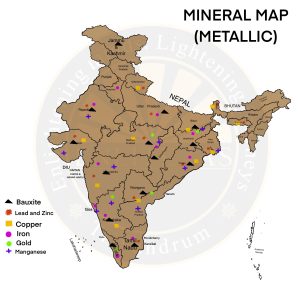Lead
- Source: Lead does not occur free in nature; it’s primarily extracted from galena (PbS), which is found in veins and masses in crystalline rocks such as schists.
- Properties: Malleable, soft, heavy, bad conductor of electricity.
- Uses:
- Products: Lead oxide (cable covers, ammunition, paints, rubber), pipes and sheets (sanitary fittings), automobile parts, aeroplanes, and calculating machines.
- Lead Nitrate: Used in dyeing and printing.
- Reserves: Found in Himalayas, Tamil Nadu, Rajasthan, and Andhra Pradesh.
- Production:
- Rajasthan: Accounts for 94% of India’s production, with key mines in Zawar and Debari (Udaipur).
- Other States: Andhra Pradesh, Tamil Nadu, and Karnataka also contribute.
Zinc
- Source: The chief ore is sphalerite (ZnS), often found with lead and other minerals like chalcopyrite and iron pyrites.
- Uses:
- Zinc Compounds: Zinc dust (for compounds and salts), zinc oxide (paints, ceramics, inks, rubber), and dry batteries.
- Other Applications: Die-casting, electrodes, textiles, and collapsible tubes for drugs.
- Reserves: Primarily in Rajasthan, which produces over 99% of India’s zinc, particularly from Zawar mines.
- Imports: Zinc concentrates are imported from USA, Canada, Zimbabwe, Japan, Mexico, and others.
Tungsten
- Source: Extracted from ores like wolframite (Fe,Mn)WO4, scheelite (CaWO4), and ferberite.
- Uses:
- Steel industry (over 95% of world tungsten is used for steel).
- Alloying for special steels, ammunition, armor plates, and hard cutting tools.
- Also used in electric bulb filaments, paints, ceramics, and textiles.
- Resources
- Karnataka (42%) and Rajasthan (27%) are the largest sources.
- Other deposits are in Andhra Pradesh (17%) and Maharashtra (9%)
- Imports and Exports:
- Imports: Mainly from Singapore, USA, and UK.
- Exports: To Germany, USA, Israel, UK, and Japan

